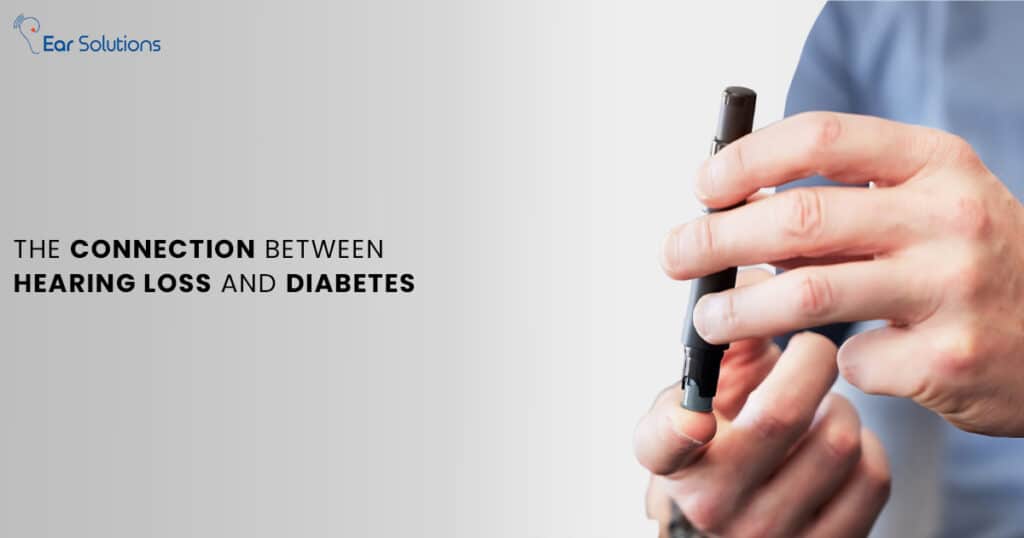There are many health conditions that are corelated to each other. One disease of health issue can lead to another one. Same goes with hearing loss and diabetes. While these two issues might seem unrelated at first look, research has shown that there is a significant connection between them. Understanding this link is essential for managing both conditions effectively and ensuring better overall health. In this blog, we will understand the link between diabetes and hearing loss and understand how to deal with these conditions.
Understanding Diabetes and Hearing Loss
Diabetes is a chronic condition characterised by high levels of sugar in the blood. It occurs when the body either doesn’t produce enough insulin or can’t effectively use the insulin it makes. Over some time, high blood glucose levels can lead to various problems, including damage to your eyes, kidneys, nerves, and heart.
On the other hand, hearing loss can result from a variety of factors, including age, noise exposure, infections, and genetic predispositions. It typically manifests as a gradual decline in the ability to hear high-pitched sounds, difficulty understanding speech in noisy environments, or a general sense of muffled hearing.
The Link Between Diabetes and Hearing Loss
Some studies have demonstrated a connection between diabetes and hearing loss. These studies highlight that people with diabetes are twice as likely to experience hearing loss as those without the condition. Several mechanisms may explain this connection
Blood Vessel Damage: High blood sugar levels can damage small blood vessels and nerves in the inner ear, similar to how diabetes can affect blood vessels in the eyes and kidneys. The inner ear’s delicate structures rely on a healthy blood supply to function properly, and any impairment can lead to hearing loss.
Neuropathy: Diabetic neuropathy, a common complication of diabetes, involves nerve damage throughout the body. This damage can affect the auditory nerves responsible for transmitting sound signals from the ear to the brain, leading to hearing impairment.
Inflammation: Chronic inflammation is a known consequence of diabetes and can contribute to various health problems, including hearing loss. Inflammatory responses may damage the cells and tissues in the inner ear, reducing hearing sensitivity.
Ototoxicity: Some medications used to manage diabetes and its complications, such as diuretics and certain antibiotics, can be ototoxic, meaning they can cause hearing loss as a side effect.
Research Evidence
A significant body of research supports the diabetes and hearing loss connection. A study from the National Institutes of Health suggested that hearing loss might be an early complication of diabetes, occurring before other signs of damage to the eyes, kidneys, or nerves.
Moreover, the severity of hearing loss appears to correlate with the duration and control of diabetes. Individuals with poorly managed blood sugar levels or long-standing diabetes are at a higher risk of developing hearing issues.
Implications for Diabetes Management
Given the strong link between diabetes and hearing loss, individuals with diabetes need to be proactive in managing their hearing health. Here are some steps that can help
Regular Hearing Screenings: People with diabetes should undergo regular hearing tests, especially if they notice any changes in their hearing. Early detection of hearing loss can lead to more effective interventions.
Blood Sugar Control: Maintaining healthy blood glucose levels is crucial for preventing complications related to diabetes, including hearing loss. Good diabetes management can reduce the risk of damage to the blood vessels and nerves in the inner ear.
Protect Your Ears: Avoiding excessive noise exposure is important for everyone, especially for individuals with diabetes who may already be at a higher risk for hearing loss. Wearing ear protection in loud environments and keeping the volume down on personal audio devices can help.
Medication Review: Individuals with diabetes need to discuss their medications with their healthcare providers, ensuring that they are aware of any potential ototoxic effects and exploring alternatives if necessary.
Consult an Audiologist: If you have diabetes and experience hearing difficulties, consulting an audiologist can help determine the extent of the hearing loss and the best course of action. You can meet an expert audiologist at the Ear Solutions hearing aid clinic in India. Hearing aids or other assistive devices may be recommended to improve hearing and communication.
Conclusion
The connection between diabetes and hearing loss is a compelling example of how one chronic condition can influence another. Understanding this relationship is crucial for both patients and healthcare providers. By taking proactive steps to manage blood sugar levels, protect hearing, and seek early intervention when needed, individuals with diabetes can help preserve their hearing health and maintain a higher quality of life.

Prerna Singh
Audiologist, Ear Solutions
Prerna Singh is an Audiologist at Ear Solutions, focused on delivering compassionate, patient-centric hearing care. She works closely with individuals to understand their hearing concerns and guide them toward practical, technology-driven solutions that improve everyday communication and confidence.
At Ear Solutions, Prerna supports the organization’s long-standing mission of transforming lives through better hearing. She is committed to hearing awareness, accurate assessments, and continuous patient support-ensuring every individual receives the care they need to hear better and live better, in line with the vision of #AbSabSunenge.





